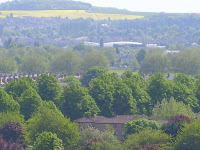
Hicham Yezza will not be deported this weekend. Perhaps the Home Office had a change of heart. Perhaps they noticed the letters, e-mails, faxes and stories in the press. Many MPs joined the campaigning students and lecturers at Nottingham University, which may have made a difference. It helps to be well known.
The story isn't over yet. So far as I know, Hich is still in detention. And the debate about academic freedom and the conduct of university and police will continue for some time.
There was one little thing that troubled me. In the anxiety about the hastily-planned deportation, I put it to one side. But now that there's a pause - and hope - I'd like to return to one argument expressed in a number of e-mails sent by academics and others. (Because I saw the argument in emails it's not possible to link to it. Instead I'm linking here to the first story in the Times Higher Education Supplement, noting that representatives of the university have suggested they may have been misreported. The university's position was amended later.)
The argument that worries me is that Hicham Yezza had no reason to look at his friend's research material, because he is currently only a low-grade clerical officer. Research, the argument implies, is only for registered graduate students and people in "proper" academic jobs.
What a load of rubbish. There's a long history of research outside universities - and universities have often disliked this. Victorian botanists - including women and working-class people - taught themselves the Linnaean system and went out to find and classify new plants. The picture shows Thomas Edward, who trained as a cobbler, but gained a reputation as a self-taught naturalist. The Autobiography of Thomas Cooper - another cobbler - gives more insight into the way in which working-class Victorians sought to gain and share knowledge.
People research for all sorts of reasons - not just to give academic papers, write monographs or achieve a successful university career. After she had retired, my mum decided to find out about her family history. She learnt about how records were kept, deciphered old handwriting and made decisions about the relative value of different pieces of evidence. She investigated different kinds of employment in the 19th century. She shared her knowledge with friends and relatives. My mum left school before her 14th birthday but what she did was research and it achieved an addition to knowledge.
Research is too valuable to be left to universities, where methods - however rigorous - can follow the tramlines of previous generations. We also need researchers outside universities, asking new questions. Thought, intelligence and questioning should be everyone's business.
It's particularly shocking that anyone in a university should assume that only academic staff are interested in learning and research. Isn't it likely that an administrator - or a cleaner, or a porter - might choose a job in a university in order to get close to learning, discuss ideas and use the library? Shouldn't a decent university give all its staff the opportunity to research - and listen to their thoughts and discoveries? I suppose it depends on whether a university is really concerned with sharing knowledge and new ideas or if its chief aims are merely recruiting students, fund-raising and self-preservation.


































